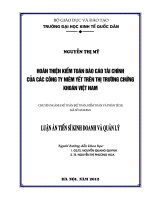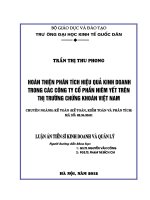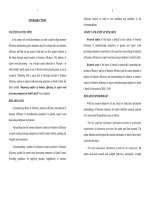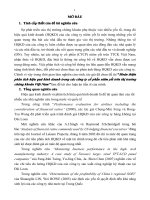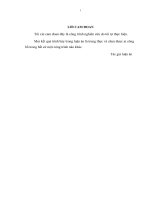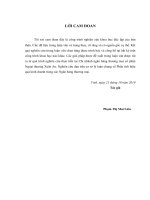tóm tắt tiếng anh hoàn thiện phân tích hiệu quả kinh doanh trong các doanh nghiệp chế biến gỗ xuất khẩu khu vực nam trung bộ
Bạn đang xem bản rút gọn của tài liệu. Xem và tải ngay bản đầy đủ của tài liệu tại đây (191.93 KB, 12 trang )
1
INTRODUCTION
NECESSITY OF THE TOPIC
In the context of overall development, in order to achieve high business
efficiency and business goals, enterprises need to evaluate their own business
efficiency and find out the causes so that they can have proper solutions in
the future through annual analysis of business efficiency. The industry of
export wood processing – one of major export industries in Vietnam – of
which South Central region is one of the four fastest growing areas, is not an
exception. Stemming from a great deal of thorough research of business
efficiency analysis in export wood processing enterprises in South Central, the
thesis entitled “Improving analysis of business efficiency in export wood
processing enterprises in South Central” was conducted.
RESEARCH AIMS
- Systematizing theory of efficiency, business efficiency and analysis of
business efficiency in manufacturing enterprises in general, export wood
processing enterprises in particular.
- Researching into the current situation of analysis of business efficiency
in export wood processing enterprises in South Central, thereby, pointing out
strengths and weaknesses.
- Recommending a number of solutions to improve analysis of business
efficiency suitable for export wood processing enterprises in South Central.
Providing guidelines for applying changes, supplements in business
2
efficiency analysis in order to test usefulness and feasibility of the
recommendations.
SUBJECT AND SCOPE OF RESEARCH
Research subject of the thesis is defined as the analysis of business
efficiency in manufacturing enterprises in general and export wood
processing enterprises in particular, at the same time concretizing the analysis
of business efficiency in export wood processing enterprises in South Central.
Research scope of the thesis is limited to theoretically researching into
business efficiency, analysis of business efficiency and the current situation of
analysis of business efficiency and recommending the solutions to improve
analysis of business efficiency in export wood processing enterprises in South
Central for the period of 2008 - 2010.
RESEARCH METHODOLOGY
With the research objectives set out, based on dialectical materialism
methodology of Marxism-Leninism, the author identifies research methods
to be used would be qualitative ones as follows:
+ For less important information (information provided by professional
organizations of information provision): the author used desk research. The
author inherited and developed the research information to build a basic theory
system for the thesis.
+ For basic information (information provided by the enterprises): the
author used desk research and in-depth interviews, particularly: in-depth
3
interviews with interview sample of 30/176 and desk research with
documents of 4 enterprises.
NEW CONTRIBUTIONS OF THE TOPIC
- Systemizing and improving the theoretical issues of business efficiency
and business efficiency analysis of manufacturing enterprises in general and
export wood processing enterprises in particular.
- Contributing to clarifying the current situation of the activities of
analyzing business efficiency in export wood processing enterprises in South
Central.
- Contributing to improving the activities of analyzing business
efficiency in export wood processing enterprises in South Central.
THESIS STRUCTURE
In addition to the introduction, conclusion and references, the thesis
content consists of 188 pages, 36 tables, 2 charts and 24 appendices made up
of three main chapters:
Chapter 1: Basic theory of analysis of business efficiency in
manufacturing enterprises.
Chapter 2: The current situation of analysis of business efficiency in
export wood processing enterprises in South Central.
Chapter 3: Viewpoints and solutions to improve the analysis of business
efficiency in export wood processing enterprises in South Central.
4
CHAPTER 1
BASIC THEORY OF ANALYSIS OF BUSINESS EFFICIENCY IN
MANUFACTURING ENTERPRISES
1.1. EFFICIENCY AND BUSINESS EFFICIENCY IN ENTERPRISES
1.1.1. Concept and nature of efficiency and business efficiency
1.1.1.1. Concept and nature of “efficiency”
Efficiency is an indicator reflecting the level of gaining the results in
order to achieve a certain aim of the subject corresponding to a unit of
resource spent in the process of implementing an activity.
Classification of efficiency:
- Economic efficiency and social efficiency
- Social production efficiency and individual efficiency
- Direct efficiency and indirect efficiency
- Absolute efficiency and relative efficiency
1.1.1.2. Concept and nature of business efficiency
a. Views on business efficiency
b. Concept and nature of business efficiency
Business efficiency is an economic category featured by a system of
specific economic indicators set on the basis of comparing the correlation
between the output and the input costsss or other input factors, thereby
reflect the level of using the input costsss and other input factors in order
5
to achieve the highest results in harmony of economic efficiency and social
efficiency.
1. 1.2. Criteria to evaluate business efficiency
The criterion to evaluate business efficiency is the appropriate level of
business and social results gained meeting the objectives set out on the basis
of economical use of social labor.
1.1.3. System of indicators used for business efficiency analysis
1.1.3.1. Principles of setting up the indicators
1.1.3.2. Indicators used for business efficiency analysis
* The indicators for evaluating economic efficiency:
+ Efficient use of input costs or input factors.
+ Rate of turnover of input costs or input factors.
+ Profitability of input costs or input factors.
* The criteria for evaluating efficiency enterprises created for the
society: the ability to provide direct and indirect employment; the ability to
contribute to the State budget
1.2. ANALYSIS OF BUSINESS EFFICIENCY IN ENTERPRISES
1.2.1. Meaning and mission of analyzing business efficiency
1.2.2. Stages of analyzing business efficiency
6
Stages of analyzing business efficiency consist of the following ones:
preparation, implementation and conclusion.
1.2.3. Methods of analyzing business efficiency
Methods of analyzing business efficiency consist of the following ones:
comparison, detail, exclusion, balance correlation, Dupont analysis and
regression.
1.2.4. Contents of analyzing business efficiency
Contents of analyzing business efficiency include analysis of business
efficiency through indicators of use efficiency, profitability and rate of
turnover of input costs or other input factors and indicators to evaluate the
social efficiency.
1.3. CHARACTERISTICS OF ANALYSIS OF BUSINESS EFFICIENCY
IN EXPORT WOOD PROCESSING ENTERPRISES
1.3.1. Characteristics of export wood processing industry affecting
business efficiency and analysis of business efficiency
1.3.2. Business efficiency and business efficiency analysis in export wood
processing enterprises
1.3.2.1. Business efficiency of export wood processing enterprises
Business efficiency of wood processing export enterprises is an
economic category represented by the specific economic indicator system
which is determined on the basis of comparison of the correlation between
7
the outputs and the input costs or other input factors of the
enterprise. Business efficiency reflects the level of using the resources of
export wood processing enterprises to accomplish their specific immediate
and long-term development objectives in order to further confirm the main
production role of export wood processing industry.
1.3.2.2. Analysis of business efficiency in export wood processing
enterprises
Analysis of business efficiency in export wood processing enterprises
also include such stages as operation of analysis, method of analysis and
content of analysis which are similar to that carried out in the other
manufacturing enterprises in general, the only difference is the indicator
system for analysis.
1.3.3. Characteristics of indicator system for analysis of business
efficiency in export wood processing industry
Indicator system for analyzing business efficiency in export wood
processing enterprises is developed based on the basic method of developing
indicators, combined with a number of specific indicators of the industry
such as productivity of sawing equipment, productivity of drying equipment,
productivity of detail processing equipment, productivity of product finishing
equipment, costs of direct materials
1.4. ANALYSIS OF BUSINESS EFFICIENCY IN SOME COUNTRIES IN
THE WORLD AND LESSONS DRAWN TO VIETNAM
8
1.4.1. Analysis of business efficiency in some countries in the world
1.4.2. Lessons drawn to analyzing business efficiency in Vietnam
Conclusion drawn from Chapter 1
To get enough power to be able to survive and grow in today’s market
economy; enterprises need to understand strengths and weaknesses of their
business activities to have appropriate policy and decisions. This is only
carried out when enterprises analyze their business efficiency. Analysis of
business efficiency is not only necessary for any specific industry or business
but needs to become a regular activity of all enterprises in all economic
sectors and all areas of business including export wood processing industry.
In Chapter 1, the author carries out in-depth study codifying the basic
theoretic issues of business efficiency and the content of analyzing business
efficiency in manufacturing enterprises in general and the export wood
processing enterprises in particular.
9
CHAPTER 2
CURRENT SITUATION OF ANALYSIS OF BUSINESS
EFFICIENCY IN EXPORT WOOD PROCESSING
ENTERPRISES IN SOUTH CENTRAL
2.1. OVERVIEW OF EXPORT WOOD PROCESSING ENTERPRISES IN
SOUTH CENTRAL REGION
2.2. CURRENT SITUATION OF BUSINESS EFFICIENCY ANALYSIS IN
EXPORT WOOD PROCESSING ENTERPRISES IN SOUTH CENTRAL
REGION
2.3. EVALUATION OF CURRENT SITUATION OF BUSINESS
EFFICIENCY ANALYSIS IN EXPORT WOOD PROCESSING
ENTERPRISES IN SOUTH CENTRAL REGION
2.3.1. Operation of analysis
Aspects carried out: There have been a number of enterprises carrying
out analysis of business efficiency.
Aspects not carried out yet: the process of analysis has not been
scientifically carried out, specifically, analysis has not been regularly done
and analyzers often lack experience.
10
2.3.2. Method of analysis
Aspects carried out: Comparison method has been used by comparing
business efficiency indicators among different business terms of the
enterprises.
Aspects not carried out yet: data of the enterprise is not compared with
that of other enterprises in the same industry and the average of the industry,
the analytical method used is still monotonous, not able to evaluate the
variable nature of the indicators.
2.3.3. Source of information used for analysis
Aspects carried out: information within the enterprise such as the
information from the accounting system and other offices of the enterprise
has been used.
Aspects not carried out yet: the quality of information within the
enterprise does not guarantee accuracy; information outside the enterprise has
not been used.
2.3.4. Content of analysis
Aspects carried out: enterprises have carried out general analysis of
business efficiency, rate of turnover of input factors and profitability of input
factors.
Aspects not carried out yet: lack of analysis of the efficiency of using
input costs or input factors, rate of turnover of costs and profitability of costs
and social efficiency.
11
2.3.5. Indicator system used for analysis
Aspects carried out: Indicator system has been used for general analysis
of business efficiency analysis and for evaluation of rate of turnover of the
assets and for profitability of assets and capital.
Aspects not carried out yet: lack of indicators related to costs analysis,
enterprises have not yet agreed on the general indicator system as well as in
identifying indicators.
Conclusion drawn from Chapter 2
Chapter 2 provides outline of the export wood processing industry in
South Central area and evaluates the current situation of analysis of business
efficiency in enterprises within the industry through documents of some
enterprises which conducted analysis of business efficiency. Current situation
of business efficiency analysis in enterprises is very much affected by the
scale of the enterprise, so there has not been much attention paid to analysis.
Therefore, the analysis of business efficiency is still very sketchy; it is prone
to required to do more than necessary to do and still focuses on the form.
Before starting with Chapter 3, the author would like to confirm once
again that business effectiveness analysis can help administrators have a
general view on the basis of analyzing the nature of research issue, thereby
based on the conclusions of analysis to determine appropriate business
strategies, on one hand to overcome weaknesses, on the other hand to
promote strengths of business activities.
12
CHAPTER 3
VIEWPOINTS AND SOLUTIONS TO IMPROVE ANALYSIS OF
BUSINESS EFFICIENCY IN EXPORT WOOD PROCESSING
ENTERPRISES IN SOUTH CENTRAL REGION
3.1. DEVELOPMENTAL ORIENTATION AND VIEWPOINTS ON
BUILDING SOLUTIONS TO IMPROVE ANALYSIS OF BUSINESS
EFFICIENCY IN EXPORT WOOD PROCESSING ENTERPRISES IN
SOUTH CENTRAL REGION
3.2. BASIC SYSTEM OF SOLUTIONS TO IMPROVE ANALYSIS OF
BUSINESS EFFICIENCY IN EXPORT WOOD PROCESSING
INDUSTRY IN SOUTH CENTRAL REGION
3.2.1. Improving the operation of analysis
3.2.1.1. Preparation for analysis
- Identifying objectives of analysis.
- Identifying scope of analysis.
- Identifying department in charge.
- Identifying the time and method of analysis.
- Making financial plan for analysis.
3.2.1.2. Implementation of analysis
Before sorting and processing information used for analysis of business
efficiency, it is necessary to select information:
13
* Information inside the enterprise mainly includes financial statements
provided by the Accounting Department and the documents provided by
functional departments. In order to increase the accuracy and value of the
output information, the information related to indicators stated in the
financial statements and other information related to costs should be
processed as follows:
- Information related to financial statements: Information should be
collected at various times to determine the average data.
- For information related to costs, especially production costs,
management accounting should be combined with financial accounting when
accounting the costs, especially in the classification of costs according to
behavior of the costs. Based on that, the enterprise can carry out reports of
business efficiency used for the internal management (including overall
report and sectional report). Analysts will base on profits determined in
sectional reports to evaluate how the performance of individual departments
affects the overall business efficiency of enterprise.
For example, the data of Tan Thanh Dung Quat Export Wood JSC, after
calculation process, the author has made the report (tables 3.5 and 3.6 on page
13).
Based on tables 3.5 and 3.6 (page 13), it is possible to evaluate the
business efficiency of Tan Thanh Dung Quat Export Wood JSC which is low
because profit bears negative value. The reason of loss in business is that the
production department and the management one have not yet achieved high
results.
14
Table 3.5: Report on business performance based on costs ensuring
balance of Tan Thanh Dung Quat Export Wood JSC
in 2010
Indicators Amount (VND)
1. Net revenue 14.580.087.241
2. Total variable costs 12.822.116.199
3. Total costs ensuring balance = (1) –
(2)
1.757.971.042
4. Total fixed costs 2.392.363.923
5. Net profit = (3) – (4) (634.392.881)
(Source: Calculated by the author)
Table 3.6: Detailed sectional report of Tan Thanh Dung Quat Export
Wood JSC
in 2010
Indicators Total
Production
department
Sales
Department
Management
department
1. Net revenue 14.580.087.241 11.955.671.538 1.458.008.724 1.166.406.979
2. Variable
costs
12.822.116.199
12.553.868.602 100.001.122
168.246.475
3.
Costs
ensuring
balance =
(1)-(2)
1.757.971.042
(598.197.064)
1.358.007.602 998.160.504
4. Sectional
fixed costs
2.392.363.923
562.777.877 212.705.510
1.616.880.536
5. Sectional
balance =
(3)-(4)
(634.392.881) (1.160.974.941) 1.145.302.092 (618.720.032)
6. General
fixed costs
0 0 0 0
7. Net profit (634.392.881) (1.160.974.941) 1.145.302.092 (618.720.032)
15
(Source: Calculated by the author)
* Next is the information collected outside the enterprise such as
developmental orientation of the export wood processing industry in South
Central region, the factors affecting prices of raw materials can be obtained
from the Department of Trade and Industry, Vietnam Association of Wood
and Forest Products,
3.2.1.3. Conclusion of analysis
This is the stage of writing report. Report needs to be comprehensive,
easy to understand and able to provide useful information for decision-
making; and must be detailed, clear, coherent, concise, but still address the
key issues.
3.2.2. Improving method of analysis
3.2.2.1. Supplementing content of comparison method
It is necessary to supplement the comparison of the business efficiency
of enterprises with the average of the industry or with other peer enterprises’.
3.2.2.2. Applying detail method
3.2.2.3. Applying exclusion method
For example, Dai Thanh Wood Technology JSC, uses the method of
continuous substitute evaluating factors affecting the rate of turnover of
short-term assets through indicator of “number of turnovers of short-term
assets”.
+ Impacts of increase in the value of assets:
DTT
0
DTT
0
∆H
TSNHTSNH
=
TSNH
1
-
TSNH
0
=
- 0,07
turnover
+ Impacts of increase in net revenue:
DTT
1
DTT
0
∆H
TSNHDTT
=
TSNH
1
-
TSNH
1
=
+ 0,35
turnover
+ Synthesis of the impacts of factors:
16
∆H
TSNH
= ∆H
TSNHTSNH
+ ∆H
TSNHDTT
= - 0,07 + 0,35 = + 0,28 turnover
3.2.2.4. Applying Dupont method
+ First, DuPont equation is established by modifying the indicator of
“Return on total assets” (ROA):
ROA = H
TS
x ROS
Of which: H
TS
: Number of turnovers of total assets
ROS: Return on DTT
After establishing DuPont equation, applying method of difference to
determine the influencing level of H
TS
and ROS to the variability of ROA
(illustrative figures of Dai Thanh Wood Technology JSC).
- Impact of variability H
TS:
∆ROA
HTS
= (H
TS1
- H
TS0)
x ROS
0
= + 0.03%
- Impact of variability ROS:
∆ROA
ROS
= H
TS1
x (ROS
1
ROS
0)
= + 1.46%
- Synthesis of impact of these factors:
∆ROA = ∆ROA
HTS
+ ∆ROA
ROS
= 0.03% + 1.46% = 1.49%
+ Second, the thesis proposes simple Dupont equation for the indicator
of “Return on common equity” (ROE):
ROA
ROE
=
T
TT
(Of which: T
TT:
The ratio
of self-financing)
3.2.2.5. Applying method of regression
The thesis proposes the method of single regression in estimation of
operating costs (including costs of sales and corporate management costs)
based on production and consumption.
- First is establishing the regression equation of the following form:
Y = a + bX
Of which: Y is total operating costs
17
a is total operating fixed costs
b is variable operating costs of output unit
X is production and consumption
- Next is collecting the data of total operating costs and production and
consumption in many consecutive terms, at least for terms. For example, data
of Dai Thanh Wood Technology JSC is as follows:
Table 3.10: Statistics of total operating costs and production –
consumption costs at Dai Thanh Wood Technology JSC
Terms
Production and consumption
(X) (item)
Total operating costs (Y)
(VND)
1 310.000 7.326.984.625
2 341.000 8.847.788.725
3 372.000 16.250.582.416
4 434.000 17.689.786.346
5 465.000 9.260.232.283
(Source: SalesDepartment – Dai Thanh Wood Technology JSC)
After calculation process done in Excel spreadsheet, the result obtained b =
29.835,64; a = 406.255.901; R = 0,41 - correlation between the total operating
costs and production and consumption costs is average and covariable
correlation.
From the results obtained, we have a function:
Y = 406.255.901 + 29.835,64 X (*)
From the function (*), the Company can determine the total operating
costs corresponding with each level of production and consumption.
3.2.3. Improving source of information used for analysis
- For the accounting information, it is necessary to ensure accurate and
absolutely objective information by organizing accounting system consisting
18
of two classifications of financial accounting and management accounting.
Opening training courses on accounting operation to ensure the accuracy of
accounting information and establishing the internal control department to
check the accuracy of the accounting information provided.
- It is necessary to open regular and periodic training courses for
managers from low to high level to have professional management team.
- It is necessary to open professional training for staff working as
analyzers and proceed to recruit a team of professional employees properly
trained for the establishment of a department specializing in business
efficiency analysis.
3.2.4. Improving the content of analysis and indicator system used for
analysis
3.2.4.1. Sumplementing the indicators of efficient use of input costss or input
factors
This group of indicators includes the following specific indicators
productivity of sawing equipment, productivity of drying equipment,
productivity of detail processing equipment, productivity of product finishing
equipment, costs of direct materials
To determine the indicator of efficiency for each stage of production,
export wood processing enterprises in South Central needs to identify the
“productive value” for each stage as follows:
+ The first way, enterprises need to track costs used in each stage of
production to determine the productive value at each stage. In this way,
enterprises will have to wear extra costs, resulting in reduction of business
results and efficiency.
+ The second way, enterprises can relatively determine the productive
value based on the percentage of costs at each stage. If the total production
costs is 1.000.000 VND then the productive value after the sawing stage will
range from 840.000 to 860.000 VND, the productive value after after the
19
drying stage will range from 880.000 VND to 890.000 VND, the productive
value after after the detail processing stage will range from 960.000 to
980.000 VND and the productive value after the finishing production stage
would be 1.000.000 – is the total costs of production.
3.2.4.2. Supplementing the indicators of rate of turnover of input costs or
input factors
- Adjusting the way of identifying indicators used in calculation is
needed by: for the indicators taken from the balance sheet, it is necessary to
use the average figure between the beginning and end of the period or the
average figure at various times to ensure not ignore the variability of the
indicators in the period.
- Supplementing the following indicators: “Number of turnovers of
assets”, “Number of turnovers of materials”, “Number of turnovers of
equity”.
3.2.4.3. Supplementing the indicators of profitability input costs or input
factors
- Adjustment to identify indicators used in calculation is needed by: for
the indicators taken from the balance sheet, it is necessary to use the average
figure between the beginning and end of the period or the average figure at
various times to ensure not ignore the variability of the indicators in the
period.
- Supplementing the following indicators: “Profitability of direct
materials”
3.2.4.4. Evaluation of social efficiency
- Stable income of workers
- Stable employment of workers
- Environmental protection
20
3.3. SOME FUNDAMENTAL SOLUTIONS TO IMPROVE BUSINESS
EFFICIENCY IN EXPORT WOOD PROCESSING ENTERPRISES IN
SOUTH CENTRAL
3.3.1. Promoting investment in forestation for materials
3.3.2. Increasing investment and promoting production of interior
furniture
3.3.3. Exploitation and use of raw materials associated with
environmental protection
3.3.4. Investment in developing human resource
3.4. CONDITIONS TO CARRY OUT SOLUTIONS TO IMPROVE
ANALYSIS OF BUSINESS EFFICIENCY IN ORDER TO IMPROVE
BUSINESS EFFICIENCY IN EXPORT WOOD PROCESSING
ENTERPRISES IN SOUTH CENTRAL REGION
3.4.1. For the State, industry, Associations and locality
- The State needs to promulgate brief regulations on forestation
registration procedures and shorten the registration time for enterprises
wishing to invest in forestation and facilitate them with loans.
- Adjustments in the legal system in the direction of more complete
which has been and will continue to be implemented are essential for the
overall development of the economy and of export wood processing
enterprises in South Central in particular.
- The State needs to have policies to support loans for wood processing
enterprises.
21
- Local authorities can create convenient conditions for enterprises
investing in forestation to be permitted to lease land for a long time (50 – 90
years) with preferential price.
- Export wood processing industry needs to pay more attention to the
operation of the associations of wood and forest product processing at the
local level and help them improve their operating capacity and position.
3.4.2. For the enterprises
- Enterprises should be aware of the importance of analyzing business
efficiency in management activities.
- Enterprises should invest in training to improve professional capacity
for staff engaged in analysis as well as accounting.
- Depending on each specific period and based on the available
processes, methods and indicator systems used for analysis, the enterprises
choose an analysis model consistent with the objectives and contents of
analysis, preparing personnel and facilities in accordance with existing
conditions to ensure the most effective and costss-saving analysis.
- Enterprises should pay more attention to investing into the analysis of
their business efficiency.
- There should be coordination between functional departments within
the enterprises.
Conclusion drawn from Chapter 3
In Chapter 3, the thesis presents the viewpoints and solutions to improve
analysis of business efficiency to improve business efficiency in export wood
processing enterprises in South Central.
22
To be able to propose solutions to improve analysis of business
efficiency, the thesis outlines developmental orientation for export wood
processing industry in South Central until 2020, analyzes viewpoints to
improve analysis of business efficiency in export wood processing enterprises
in South Central. After proposing solutions to improve analysis of business
efficiency in export wood processing enterprises in South Central, the thesis
also proposes a number of measures to improve business efficiency of these
enterprises and propose the necessary conditions to implement the solutions.
CONCLUSION
The thesis presents the theoretical issues of efficiency, business
efficiency, analysis of business efficiency in the manufacturing enterprises,
business efficiency and analysis of business efficiency in export wood
processing enterprises; and provides overviews of export wood processing
enterprises in South Central region and the current situation of analysis of
business efficiency in these enterprises. On that basis, the thesis proposes
possible solutions to improve analysis of business efficiency as a basis to
improve business efficiency of export wood processing enterprises in South
Central region in the future. The solutions presented in the thesis are feasible
not only for export wood processing enterprises in South Central, but also for
enterprises in the same industry of the country.
Research results show it is unlikely to deny the role of analysis of
business efficiency for the operation of export wood processing enterprises
in South Central region in particular and the manufacturing enterprises in
general. Process of analyzing business efficiency only really brings high
value for management when there is a close link from the operation,
23
methods, contents and indicators of analysis. To meet those requirements,
the thesis entitled “Improving analysis of business efficiency in export
wood processing enterprises in South Central” researches and addresses
the following contents:
1. Systematizing basic theory of business efficiency and analysis of
business efficiency in manufacturing enterprises in general and export wood
processing enterprises in particular.
2. On the basis of general theory, the thesis presents the current
situation of analysis of business efficiency in export wood processing
enterprises in South Central and makes reasonable evaluation.
3. In order to help export wood processing enterprises in South Central
conduct analysis of business efficiency easier and more convenient, the thesis
proposes a number of solutions to improve the analysis of business efficiency
based on the developmental orientations of the industry and the viewpoints on
improving business efficiency analysis including:
+ Improving the activities of analyzing business efficiency,
supplementing function of management accounting in cost management in
order to provide qualified information and evaluating activities of inefficient
department affecting business efficiency of the whole enterprise;
+ Completing contents of comparison method in the analysis by
comparing the average figure of the industry, supplementing detail method
supplementing the method of continuous substitute and Dupont analysis
method to consider the factors affecting the analysis indicators and
supplementing the method of single regression to predict the operating costs;
+ Improving the system of analysis indicators with additional
indicators including: the system of indicators used to evaluate efficiency of
24
using input costs or input factors; a number of indicators evaluating the
rate if turnovers of input costs or input factors, including: “Number of
turnovers of the total asset”, “Number of turnovers of raw materials” and
“Number of turnovers of the equity”; supplementing a number of
indicators evaluating profitability of input costs or input factors, including
“The profitability of direct material costs”.
4. Proposing some basic solutions to improve business efficiency of
export wood processing enterprises in South Central.
5. Proposing recommendations to the State, the authority agencies, the
Associations of wood and forest products and export wood processing
enterprises in South Central to help ensure the performance of feasible
solutions to improve the analysis of business efficiency and business
efficiency.
Although there have been a lot of efforts invested into the thesis, the
research results presented in thesis are only very small contributions in such a
broad and complex field as analysis of business efficiency of enterprises. Due
to limited time and experience, the thesis of researching into analysis of
business efficiency of export wood processing enterprises in South Central
cannot avoid shortcomings. Therefore, the researcher wishes to receive the
feedbacks from her instructors, colleagues and those interested in this thesis
for further improvement of the thesis.


